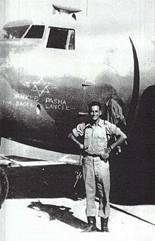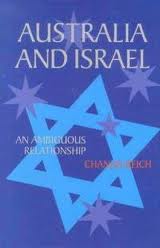Aircraft acquisition from Anglo countries
On 29 May 1948, two weeks after five Arab states had declared war and invaded Israel,
a UN embargo on arms shipments to the Middle East was imposed.
Despite this embargo, a limited number of aircraft were acquired by Israel
in its earliest days.
Aircraft from Australia to Israel 1948+.:
Chanan Reich
reported in his classic book that during the first crucial two years,
1948-9,
6 aircraft arrived in Israel from Australia.
Suzanne Rutland has reported that
these six comprised five US manufactured aircraft, viz.,
one DC5, one Lodestar, 3 Lockheed Hudson,
and an Australian built plane ( referred to by Rutland as a "VHA RR."
)

DC-5 Yankee Pasha - The Bagel Lancer
The DC-5 as VH-CXC during the Pacific War.
|
|


|
|
The one DC-5 in the Israeli AirFoce was one of only 12 DC-5 aircraft ever manufactured.
After a chequered history, it flew as a US military aircraft in the Pacific War,
before being acquired by civilian operators in support of the US military in the South Pacific.
The DC-5 flown to Israel on May 26, 1948 had the markings of
New Holland airlines, a precursor to Ansett Airways.
and registration number VH-CXC (correct was VH-ARD). These markings
were painted over and it
was crudely labelled Yankee Pasha - The Bagel Lancer
about a Star of David.
Used by Israel during the 1948 War ferrying troops and supplies into the Negev,
it was also reputedly also used as a clumsy bomber lacking bombracks.
|

The Lockheed Lodestar 18 with US markings.
|
|

The Lockheed Hudson with US markings.
|
Another 80 war-surplus planes from the Pacific Theatre were collected in Australia but blocked from export to Israel even in 1950.
It is worthy of note that the six planes from Australia acquired by Israel
were in fact all purchased in Australia during a period that the UK government expressed support in principle
for an embargo on arms shipment to the middle east, and blocked any such exports to Israel,
but felt 'they had [to] "honour contractual obligations" to the Arab
states', obliging the UK to expeditiously ship arms to the Arab countries
seeking to destroy Israel.
|
References
- Adelman, Howard, Australia and the Birth of Israel: Midwife or Abortionist?, Australian Journal of Politics and Hstory, vol 38, no 3, pp 354-374.
- Suzanne D. Rutland, Seeking "Treasure Island": Manpower and Arms from Australia and the South Pacific to Israel, 1948-1950,
Australian Jewish Historical Society Journal, Vol 20, (2011) Part 2, pp307-321.
- Suzanne D. Rutland, 1948 and the Creation of the State of Israel: a watershed period for Australian Zionism, Australian Journal of Jewish Studies, Vol. XIX, 2004
- Chanan Reich, Australia and Israel: An Ambiguous Relationship,
Melbourne University Press, Melbourne, 2002.
-
A FOOTNOTE
One of the very few published stories of the acquisition of planes in 1948-9 can be found in a dubious newspaper story in the
Daily Express (London) Monday September 20 1948
recounting how UK manufactured "Beaufighters, Mosquitos and Halifaxes" acquired
in the UK were spirited to Israel.
- Israel finally achieved air superiority in the two months before the final cease-fire of January, 1949,
following the purchase in October 1948 of 50 WW2 Spitfires from Czechoslavakia,
most of which reached Israel intact before the January 1949 cease-fire. See
this
report.
|







